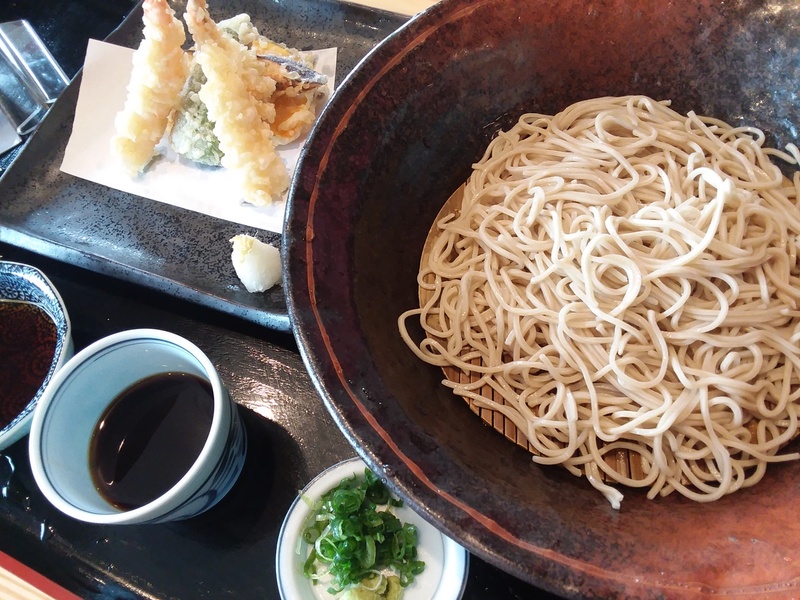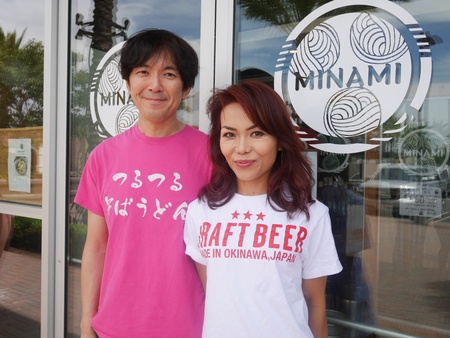The reason why he decided to start a business after leaving a beer company and open a soba restaurant
In recent years, the map of Japanese food in Southern California has become increasingly dense. Sushi arrived in the 1960s, followed by tempura and shabu-shabu, and more recently izakaya, ramen, udon, and yakitori - the types of Japanese food known to Americans are becoming more and more diverse. And then there's soba. About 20 years ago, a soba restaurant called Otafuku opened in Gardena, south of Los Angeles, and became popular. A few years ago, Tanakaya opened in Tustin, and soba has quietly become deeply known.
Minami Soba Izakaya, which opened in the fall of 2018 in Laguna Hills, Orange County, felt that it had the potential to push the soba boom to new heights. I visited the restaurant in February 2019, relying on rumors that had spread to the South Bay that "Minami's soba is delicious." The restaurant has high ceilings and a modern, loft-like interior. The atmosphere is far from that of a traditional soba restaurant, but when I asked the owner, Mr. Hattori, later, he told me that he had tried to reflect "the image of a factory where soba is made" in the interior.
On this day, I ordered Burdock Tempura Soba. The firmness of the freshly made soba noodles and the crispy fried burdock were exquisite, but what surprised me as well as the taste and texture was that you could choose the amount of soba from 100g, 200g, or 300g. It was also refreshing that the price was the same regardless of which of the three options you chose.
I learned from the staff that the owner of this restaurant is Ray Hattori, originally from Aichi Prefecture. After that, I had the opportunity to speak with him once by phone and again at the restaurant. Hattori was originally an employee of Asahi Beer. After retiring from his position as president of the US corporation, he chose to work in America as a restaurant business consultant. Having worked at several of Asahi Beer's US bases in Hawaii, New York, and Los Angeles, he may have been confident in his knowledge of Japanese restaurants. However, he came to the conclusion that if he wanted to call himself a consultant, he should try to manage a restaurant himself.
So they teamed up with a company that operates a large restaurant chain in Japan and decided to open a Japanese restaurant in Southern California. This is how Soba Izakaya Minami was born. Why soba? When asked, Hattori explained, "Firstly, as a Japanese person, I wanted to create a restaurant that people would say, 'this tastes authentic.' Secondly, there are many Japanese restaurants and ramen shops in Orange, but not many soba shops."
Market research done on the ground - a store with queues in just a few months
Minami has not only been gaining popularity through word of mouth, as mentioned above, but has also achieved visible results in just a few months since opening as a restaurant with actual lines. Many Japanese restaurants have opened, but have repeatedly closed without getting on track, so Hattori must have done some thorough market research. When asked how, he replied, "I became a Lyft and Uber driver." If you think about it, customers of ride-hailing services in car-oriented California must often use the service to go to and from restaurants for reasons such as drinking alcohol. Hattori himself got behind the wheel and talked to them to find out what places they were going to and what kind of restaurants they were going to, and listened to what people wanted.
As a result of some on-foot marketing, the location was decided to be inside a mall with a Trader Joe's, just a few minutes after getting off the freeway. The restaurant serves "freshly made" soba noodles, which are made in a noodle machine only after an order is placed. The menu also offers udon noodles, but while they will accept udon for takeaway, they will not accept soba noodles. This is because Hattori is so particular about "freshly made" noodles. And while initially they aimed to serve authentic soba noodles that Japanese customers would be satisfied with, American customers now make up the majority of their customers. This must have been another happy surprise born out of word of mouth.
Furthermore, in the evening, as the restaurant's name suggests, it turns into an izakaya. The beers on offer are Asahi Beer, Hattori's old beer, and Okinawa's Orion Beer. Okinawa is the hometown of Hattori's wife, Sayuri. The menu features a large number of Okinawan dishes, including juicy Okinawan-style taco dumplings, taco rice, carrot stir-fry, goya chanpuru, tofu chanpuru, jimami tofu, and brown sugar zenzai. Just like the authentic soba, authentic Okinawan cuisine is becoming the restaurant's signature dish. An American who was stationed in Okinawa and lives nearby has become a regular customer, saying he feels nostalgic about the place.
However, while Sayuri serves Okinawan cuisine because she wants to spread the cuisine of her hometown, her husband Hattori has a slightly different perspective. "I was stationed in Hawaii when I was working for Asahi Beer. What struck me at the time was that even though there are so many people of Okinawan descent, there are no Okinawan restaurants to be found. I feel that there is great potential for Okinawan restaurants, not only in Hawaii but also on the American mainland." His words gave us a glimpse of Hattori's side as a restaurant consultant.
Soba Izakaya Minami Facebook page >>
© 2019 Keiko Fukuda







